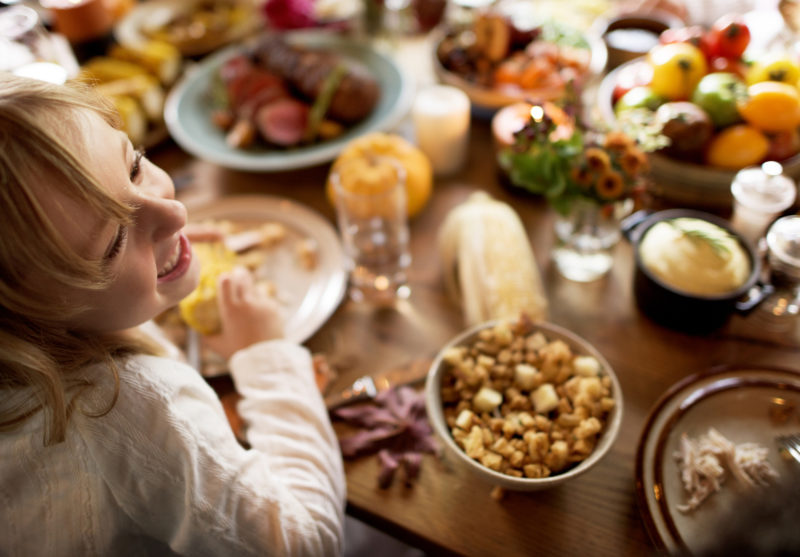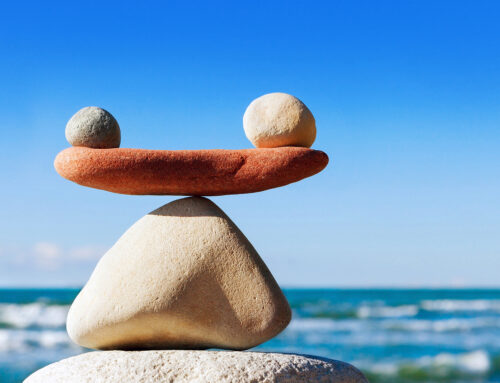Going Beyond the Gratitude List to Weave in Thanks Throughout Your Day
I have a complicated relationship with Thanksgiving. When I was young girl growing up in New England, we learned how the Pilgrims welcomed their friends the Indians to the table for a meal of friendship. When I got older, I learned the story was a bit more complicated than that. Now, as an adult and a parent, I have reclaimed my relationship with the holiday, and it has become one of my family’s favorites. And we’re not alone. In spite of our differences, people all over America still honor this fundamentally secular, inclusive holiday that centers around, as the name implies, the giving of thanks.

Yet, as we approach the season of giving, like many of us, I often find myself getting lost in the added hustle and bustle that comes with the holidays. Gratitude sometimes becomes an afterthought rather than a mindful practice seeped in the present moment, and the true intent of the holiday season often gets buried under gatherings, gifts and grand plans. And while keeping a running gratitude list can be helpful, it can also quickly become a rote act that loses touch with the intention behind the practice.
Last year, knowing that I tend to get extra busy during the holidays, I came up with a mindfulness practice to connect with gratitude and the true intent of the holiday season. Although I didn’t execute the practice perfectly every day last year, I can say that when I did, it helped a lot. With Thanksgiving right around the corner, I’ve already started implementing the same, simple gratitude practice into my nightly routine. And, I offer it here to you, too, with the sincere hope that taking some time to focus on what is good, right and joyful in your life rather than dwelling on what went wrong—which we all do at times—will foster more ease, peace and joy for you and your loved ones this holiday season and beyond.
If You Seek It, You Can Find It
Let’s face it, things often don’t go as planned. And, with increased interaction with family, trying to manage out-of-town guests and the heightened feelings of depression, anxiety and loneliness that can be triggered this time of year, the holiday season can sometimes feel more hectic and heavy than it does happy. In order to mitigate stress and maintain a balanced mood, it can be helpful to spend at least a few minutes at the close of each day thinking about and giving thanks for what did go well. Regardless of how seemingly disastrous the day went—perhaps on Thanksgiving the turkey was overcooked, Aunt Mabel hit the whiskey after dinner and caused a scene, your kids got into a very public and very embarrassing fight, etc.—identifying what did go well can infuse your memory of the day with a little more lightness. Taking the time to notice even seemingly small things, such as the beauty of the afternoon sun playing on a leaf in the process of turning color or that you hit all the green lights on the way home from the store, etc., can help you experience greater positivity.
Science Says Gratitude Is Good For Us
It’s not just mindfulness practitioners who understand how far a little thanks can go in improving overall wellbeing. The science supporting the benefits associated with practicing gratitude are numerous and growing in depth and volume.
According to research cited in How Gratitude Changes You and Your Brain, an article published by the Greater Good Science Center at UC Berkeley, people who consciously count their blessings tend to be happier and less depressed. Evidence from studies conducted by the authors of the article also suggest that people who write down their gratitudes (in the form of a letter for the purpose of this study) reported experiencing significantly better overall mental health. They felt less inclined to ruminate over negative thoughts and were more apt to release toxic emotions. Furthermore, the findings of this study and others suggest that the simple act of feeling and expressing gratitude may have lasting, positive impacts on the brain.
Additional studies outlined in 7 Scientifically Proven Benefits of Gratitude found that the regular practice of gratitude is proven to open the door to more relationships, improve both physical and psychological health, enhance empathy, reduce aggression, promote better sleep, improve self-esteem and increase mental strength.
Most of us would agree that sleeping better, experiencing better mental and physical health and engaging in more positive relationships lead to an overall improved sense of wellbeing. However, it can be difficult to connect with what is going right when feeling overwhelmed, overloaded, overlooked or stuck in a rut. The good news is that regardless of what you have planned this holiday season, you can connect with the small things that bring a little joy, and keeping a running gratitude list can help. Through spending a few mindful moments with yourself each day, you can begin recognizing the good that exists even on the most challenging days, give yourself permission to experience a wide breadth of feelings and mindfully shift your perspective.
Keep A Gratitude List: A simple practice in expressing thanks
At the end of each day, perhaps when you have a quiet break in your evening routine or just before or after you climb into bed, take a few minutes to mindfully reflect upon your day and mentally list (bonus points if you have the energy to write it down!) at least three things that went well throughout your day. Again, these don’t have to be big things, although if they are, hooray for you! Mostly, however, it’s the small, seemingly ordinary moments that make up our lives. Maybe you got a great adjustment from your yoga teacher, your child drew you a picture at school or the majority of what you had on your grocery shopping list happened to be on sale.
Whatever you come up with, stay with each thought for a few breaths. Tap into how reflecting on a kind gesture of another or something you were present enough to notice and appreciate makes you feel.
Now go a little deeper and notice your attributions. To whom or what do you attribute what you are feeling grateful for? Ask yourself if you had anything to do with it. Oftentimes, we can fall into a nasty pattern of attributing positive things that happen to us to external factors (ex: “I got the job because nobody else must have applied” vs. “I got the job because they know I am a great fit for the job”) and, alternatively, blame ourselves for what goes wrong and/or simply fail to notice what we do to attract positivity into our lives.
I invite you to actively challenge any ways of thinking about thanks that leave you out of the equation and work on shifting your perspective. Try to connect yourself to one or all of the gratitude items on your list. Perhaps you were present enough to notice the beauty of a sunset. Maybe thank yourself for being a kind, supportive parent who inspires your child to engage in creativity and share his or her work. Maybe you can even be grateful to yourself for putting down your phone to listen to your daughter and look at her artwork, even though it was hard to pull yourself away from what you were doing. If we try hard enough—and usually the more we spend time with personal attribution the easier it becomes—we can almost always create a link between what we are thankful for and the goodness within ourselves, creating a win-win of good feelings about the world around us and a little extra dose of self-compassion.
Gratitude Every Day!
While the days leading up to Thanksgiving are a great time to start this simple practice, commit to making it a habit that you return to day after day. Do it every night and notice how you feel. Share it with others and/or keep a journal of thankful thoughts. Up-level the practice and involve family and friends. Share what you’re thankful for and let the people you love know how and why you’re so grateful for them. Spread the gratitude and spread the love. Doing so will likely not just brighten your day, but also another’s. And, who knows, you might just start something that keeps getting paid forward, spilling into the lives of your people and your people’s people and your people’s people’s people, lighting up the holiday season and beyond with a little extra love, peace and joy.

Samara Vachss Serotkin, Psy.D. is a mindfulness-based psychologist and coach, as well as a mother and wife, based in Seattle, USA. She blogs regularly at www.focusandthrive.com, is a contributor at the Huffington Post, and is the author of two upcoming books.





